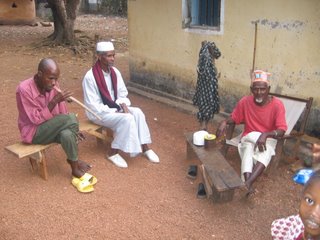A few days later we were piling back into the bus. We drove back west and then south towards Sierra Leone. Lush and tropical, we crossed a bridge over the wide river, drove down the tree-lined road from the market, and entered our new training site office. We had arrived in Foracariah, our home for the next 12 weeks. We nervously changed into our best outfits for the community’s welcome ceremony. The Peace Corps and community officials gave brief speeches, and we chose a member of our training group to deliver a speech in French to our new homestay families.
As they called out our names one by one, we sat with our new homestay families. My new mom brought her tiny young baby, Issiaga, to the ceremony, along with my dad and aunt. Next we dragged our luggage to our new homes, embarassed by the display of sheer wealth in comparison to our new surroundings. We wove between concrete house and mud huts down a hill for awhile and I wondered how I would ever find my way to and from the house for training. The family gave me my own room; the kids all shared mats on the floor in the storage room and my parents slept in their room with the baby. We had a four-room house, with a nicely decorated living room and latrine and shower area out back.
Sometimes I would go to the market with my mom on the weekends to buy produce to make sauce for the rice. I helped pound the vegetables for sauce, pulled water from the well, learned to do my laundry with a washboard, and played with my homestay siblings. My family knew I was working on improving my local language, Pular, and worked to speak with me in Pular instead of French.
Training consisted of group sessions to learn cultural norms, medical self-treatment, security, and logistics. We broke off for smaller groups for sectoral learning (agroforestry in my case) and language learning. Once achieving a certain level of French, volunteers began local language classes. I attended some French classes in the beginning, but chose to continue Pular study on my own. Soon I would return to the village I was previously assigned, so I knew which local language I needed to learn. The new trainees studied French and waited a month before their sites were announced so they could start local language training.
Though a second round of training was at times repetetive and frustrating, I was glad to integrate with the new group of volunteers with whom I would spend my 2 years of service in Guinea. My friends from the previous group helped out with the training in one-week segments, so it was also a wonderful opportunity to reconnect with them. After 6 weeks of training, Peace Corps agreed that I was ready to begin my service at site. Our training group went to see our sites for the first time for a week-long site visit with neighboring volunteers. I had a rare opportunity to do my site visit with the volunteer who was finishing up her service at my site. It was amazing to hear her perspective after 6 months in my village for work projects and insight about community members. She and her husband, who had recently returned to the States to start his new job, had prepared tree nurseries for me in the village. It really helped to have a small project up and running to keep me occupied and focused. The leaders of the village held a ceremony for the two of us, to celebrate her departure and my arrival. We gave them packets of kola nuts, a caffeinated nut traditionally used for ceremonies and given as a sign of respect.

Homestay women praying

Homestay siblings on the way to school

Laundry in the concession

Laundry

Homestay living room

Rice and fish sauce

Siblings eating

Siblings with oil palm fruits

Pounding vegetables to prepare sauce

Sauce ingredients

Pounding hot peppers in the mortar

Fatimatou preparing lunch

Tailor

Selling hot peppers in the market


Going to the market

In the market

Trip to the beach, rusted ship

Bridge to the beach

Homestay elders, man on left is brushing teeth with the toothbrush tree

Diamond mine wastewater

Diamond mine camp

Diamond mine river

Craig and Ali in Guinean clothes

Ali in Guinean clothes

Alex and Rachel in Guinean clothes

Rob and Joel in grand boubous

Joel and Diana in Guinean clothes

Foracariah gardens

Foracariah road

River